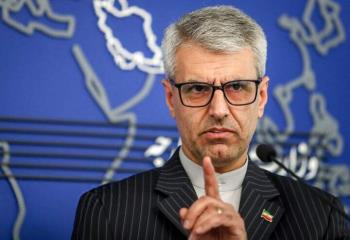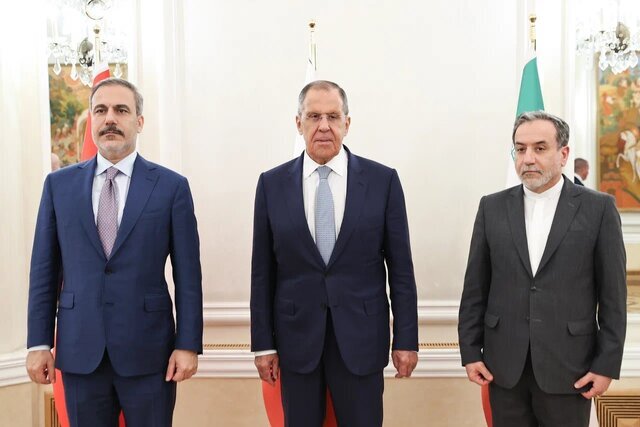Alwaght- With the start of the new round of offensive on Aleppo and other Syrian cities by the terrorist groups, the Astana initiative countries have once again convened in Doha to find a way to the crisis in Syria.
Iran's Foreign Minister Seyyed Abbas Araqchi, Turkish Foreign Minister Hakan Fidan and Russian Foreign Minister Sergey Lavrov, who had spoken to each other by phone and directly about the security developments in Syria over the past week, met on Saturday on the sidelines of the Doha Global Forum and in the Astana format to discuss the political and security developments in Syria.
With this round of trilateral talks, the Astana meetings reached their 23rd station; but in a new place and in an atmosphere far removed from the cooperation of the three countries that guarantee the ceasefire in recent years.
Lavrov on Thursday commented on the details of the meeting, saying: “We are negotiating with our Turkish and Iranian partners to hold a ministerial meeting of the Astana process in the coming days. There will be a need to return to the strict implementation of previous agreements, because the Idlib de-escalation zone has become a place from which terrorists have moved to seize Aleppo."
Lavrov further stated: “The agreements reached in 2019 and 2020 will allow our Turkish friends to control the situation in the Idlib de-escalation zone and separate the line of the Hayat Tahrir Al-Sham from the opposition that is not on the list of terrorists, but it seems that this has not happened yet.”
Lavrov considered what is currently happening in Syria to be a complex game, saying that the US, Israel and Britain have interests in this crisis and Tel Aviv wants to distract attention from Gaza war.
"This is a difficult game, and there are many players involved, and I hope that the meetings planned for this week will help stabilize the situation," Lavrov added.
The meeting comes as terrorist groups led by Tahrir Al-Sham are advancing on various cities in northern Syria, including Idlib, Aleppo and Hama, and heavy clashes with the Syrian army continue in various areas.
The Astana process was launched by participants in two Syrian opposition conferences in May and October 2015 in the capital of Kazakhstan and serves as a diplomatic umbrella that brings together the various military actors involved in Syria.
After two years of fruitless meetings between the opposition and the Syrian government, the international aspect of the process dropped and the crisis management talks were limited to the three countries of Turkey, Russia and Iran, along with the Syrian government. Since January 2017, 22 rounds of these talks have been held between the officials of the three countries.
Turkey, Iran and Russia are the guarantors of peace in Syria under the Astana process. Typically, the final statements of the Astana meetings emphasize the need to maintain Syria's sovereignty, independence and territorial integrity, continue the ceasefire process, draft a new Syrian constitution, and prepare the ground for the return of the country's refugees.
Issuing warning to Ankara
Despite the fact that the basis of the Astana talks since their initiation has been ceasefire and de-escalation, it also pursues a different aim aside from the field developments and recent advances of terrorists.
Russia and Iran know very well what kind of complicated plot the US and the Israeli regime have drawn for the region, and therefore they are trying to remind Turkish President Recep Tayyip Erdogan not to fall into the trap of the West for the second time, because given the inflamed situation in the region, the insecurity in Syria will make the situation worse than it already is.
In this connection, Hassan Hanizadeh, an Iranian expert of West Asia political affairs, told Alwaght that since Turkey is a member of NATO and since this Western military bloc has a role in Syria instability, Ankara is working against Damascus on the behalf of the West. But it should commit to the Astana agreement and handle the situation in a way to help the Astana format reach a settlement to stop conflict in Syria, otherwise insecurity will devour the whole region and this is in nobody's interest.
Although Turkey has sat at the same table with Russia and Iran in recent years and has seemingly shown itself to be aligned with these two countries, it has always played a double game and continues to support terrorist groups and try to create a buffer zone in northern Syria.
Erdogan, who failed in his attempt to normalize relations with Damascus, believes that by taking advantage of the chaotic situation in the region and with the help of terrorists, he can pressure Syrian President Bashar al-Assad and wrest concessions from this country.
Therefore, given Moscow and Tehran's firm support for the legitimate government of Bashar al-Assad, the Doha meeting is a good opportunity for Damascus' two powerful supporters to tell Turkey not to further complicate the security situation in Syria and that Ankara would be better pursuing diplomacy to resolve its problems with Damascus.
Prospects of Astana meeting
Since current Syria crisis comes in the middle of ignited West Asia crises, the success of Astana meeting depends on many variables.
Hanizadeh continued that this meeting is being held at a time when the takfiris are trying to strengthen their position by seizing Homs and Aleppo and cutting off the lines of communication between the north and the south, which will put the Bashar al-Assad government in a front of a military and security challenge. What the actors in the Syrian crisis have planned is for the terrorists to occupy Damascus and, by overthrowing the Bashar al-Assad government, establish a regime similar to the Taliban in Afghanistan.
Commenting on the plot the Western-Israeli camp has drawn for Syria, Hanizadeh said: "A security belt from Golan to Daraa in southern Syria is to be established to protect the security of the Israeli regime. So, Iran is sensitively seeking to end this crisis and help Damascus. The Astana meeting can be considered a solution to end the Syrian crisis, provided that Turkey refrains from helping the takfiris. Because these groups are considered a danger to the central government of Syria due to the training they have received from Turkey and the West, and they must be stopped, and this meeting can be decisive."
Asked if Astana meeting can make a success in the present conditions, the political expert further maintained that "this meeting could be an affirmation that all the terms of the agreement are operational and Turkey, which has violated its terms, has an important role in these developments. Also, Baghdad meeting between Iran and Iraq could be effective in finding a solution to end the Syrian crisis. The Syrian government is also trying to gain control of the situation and in the coming days, the Axis of Resistance will try to expel the terrorists from Syria and restore security to the country."
Since the US and Israel are seeking to damage Iranian and Russian interests through intensifying the crisis in Syria, the new Astana meeting can be a response to Western-Israeli moves and also can open a new chapter in the Tehran-Moscow strategic and military relations.



























